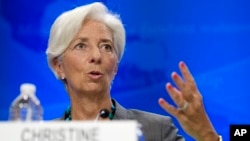The International Monetary Fund trimmed its forecast for U.S. economic growth this year, but IMF Managing Director Christine Lagarde still said the world's largest economy "is in good shape."
In its annual assessment of the U.S. economy, the IMF predicted 2.2 percent growth this year, down from last year's 2.4 percent figure, and also lower than the 2.4 percent projection for 2016 the Washington-based agency made two months ago. Lagarde predicted the U.S. unemployment rate would remain below 5 percent.
The U.S. economy is off to a slow start this year, up only eight-tenths of a percent in the January-to-March period, with weak consumer spending, which accounts for 70 percent of the U.S. economy, one of the prime factors in narrowing the economic advance.
Economic impediments
Lagarde said she sees four forces holding back U.S. economic growth: declining labor force participation, falling productivity, income inequality in the country, and high levels of poverty.
"The workforce is aging," she said, adding that the productivity that once advanced by 1.7 percent annually before the 2008 recession now is only edging ahead by four-tenths of a percent each year.
She said there is growing "income insecurity" in the United States, a decline in living standards that has left nearly 15 percent of the population — about 47 million people — living below the poverty line.
Lagarde said if the problems are left unchecked, they will "corrode the underpinnings" of U.S. growth.
She called for U.S. officials to boost the official $7.25 national hourly minimum wage, a figure some states and cities already are increasing to as much as $15 an hour. Lagarde also called for paid maternity leave, noting the United States alone among the world's wealthy nations does not provide such a benefit.




